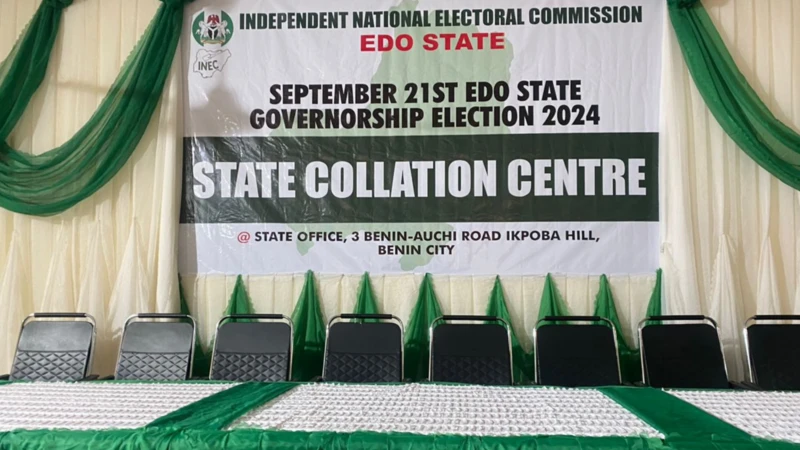INEC Clarifies Status of Edo Election Results, Warns Against Misinformation
The Independent National Electoral Commission (INEC) has confirmed that it has not yet received official results from any of the 18 local government areas (LGAs) in Edo State following the governorship election held on Saturday, September 21, 2024.
In an interview with Channels Television, Anugbum Onuoha, the INEC Resident Electoral Commissioner (REC) in Edo State, clarified that the results remain at the ward level and will need to be processed at the local government level before they reach the state collation center.

“I cannot categorically tell you when we will announce the results in the state,” Onuoha stated, adding that the commission will announce the results as soon as they are received. As of now, there are no official results from any of the LGAs.
Onuoha also issued a stern warning to social media users who have been sharing supposed election results online. “It is not their duty to announce results,” he emphasized. INEC has not released any official results, and only the designated returning officer has the authority to make such announcements. He urged the public to be cautious and refrain from spreading misinformation, as no one else is legally empowered to declare the results of the election.
Despite the lack of final results, INEC has made significant progress in making polling unit data available. By 7:40 PM on Saturday, the commission had uploaded over 90% of the polling unit result sheets to its Result Viewing Portal (IReV). Out of the 4,519 polling units in Edo State, the result sheets from 3,995 units have been made available online.
The governorship election in Edo State is part of a select group of off-season elections, which include Anambra, Bayelsa, Ekiti, Imo, Kogi, Osun, and Ondo states. This particular off-cycle election was prompted by legal disputes and court rulings in past election cycles. The new governor will replace the incumbent, Godwin Obaseki, who is nearing the end of his constitutionally mandated two terms, which will conclude on November 12, 2024.
According to INEC, Edo State has a total of 2,629,025 registered voters, of which 85.57%, or approximately 2.25 million, have Permanent Voter Cards (PVCs) and are eligible to vote. These voters will determine who succeeds Obaseki.
Although 17 candidates are competing for the governorship, political analysts have narrowed the race down to three main contenders. Asue Ighodalo of the Peoples Democratic Party (PDP), Monday Okpebholo of the All Progressives Congress (APC), and Olumide Akpata of the Labour Party (LP) are seen as the leading candidates. Each of these parties has a strong foothold in different parts of the state.
For instance, the APC holds influence in Edo North and Central, with prominent figures like Senator Adams Oshiomhole and Monday Okpebholo. On the other hand, the Labour Party, led by Senator Neda Imasuen, holds sway in Edo South, where Akpata originates from. With strong representation from these regions, the election outcome is anticipated to be closely contested.
As the results are awaited, INEC has stressed the importance of patience and accurate reporting. Any premature announcements or unauthorized sharing of results could mislead the public and create unnecessary confusion in what is shaping up to be a significant election in Nigeria’s South-South region.